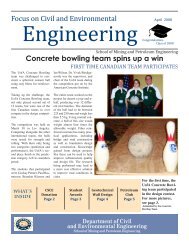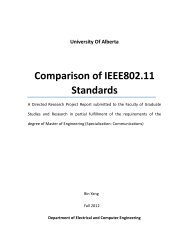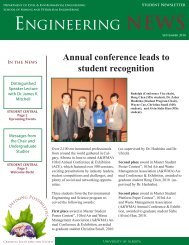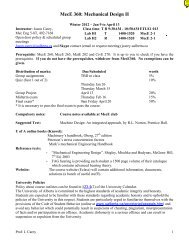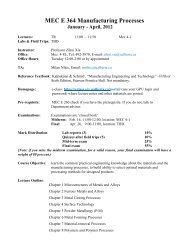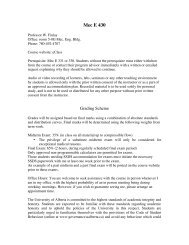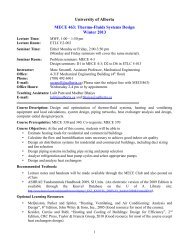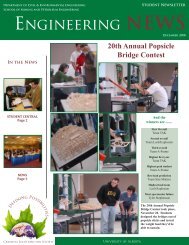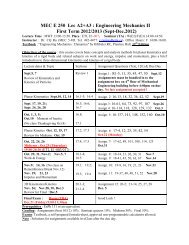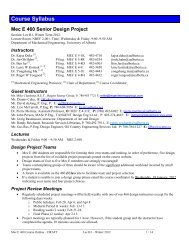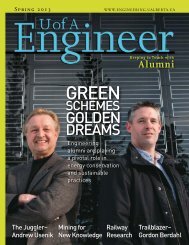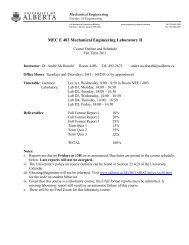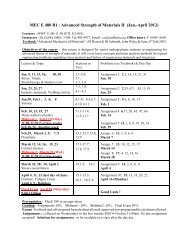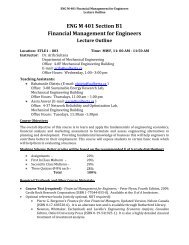Download - Faculty of Engineering - University of Alberta
Download - Faculty of Engineering - University of Alberta
Download - Faculty of Engineering - University of Alberta
You also want an ePaper? Increase the reach of your titles
YUMPU automatically turns print PDFs into web optimized ePapers that Google loves.
shareholder value,’” he says. Suddenly,<br />
Monga realized that sophisticated problemsolving<br />
skills could be utilized in business.<br />
“It was a career moment. That’s when I<br />
thought ‘Wow.’” Monga began training himself<br />
to think from a shareholder or bigpicture<br />
perspective.<br />
“There will be a time in every engineer’s<br />
career where someone will say, ‘Your analysis<br />
really helps us and gives us a range <strong>of</strong> options<br />
on how we will be going forward,’” says<br />
Monga, founder <strong>of</strong> Toronto-based Nytric<br />
Business Partners, an international venture<br />
advisory firm. Monga wants to pass along<br />
that insight.<br />
Today, Monga writes an investment<br />
column in the National Post. An executive<br />
pr<strong>of</strong>essor <strong>of</strong> finance at the U <strong>of</strong> A’s School <strong>of</strong><br />
Business, Monga helped launch the MBA in<br />
finance specialization and taught corporate<br />
finance to U <strong>of</strong> A engineers for two years<br />
while working on his PhD. He believes those<br />
introductory business courses are enough for<br />
young graduates.<br />
“The focus should still be engineering,”<br />
he says. “I think we need to bring industry<br />
leaders into the classroom to inspire students.<br />
It would be nice to get perspectives from<br />
engineers who have done well.”<br />
“We need to bring people aged 35 to 40<br />
into the classroom, including alumni who<br />
have moved beyond their training to nonengineering<br />
management,” says Monga. “We<br />
need more mentors—people who are willing<br />
to come back on campus, willing to talk<br />
about what they’ve done and make that connection<br />
early on in their careers.”<br />
Hlady views management training as<br />
vitally important to his future prospects.<br />
It helps him to better assess organizations<br />
as he gauges employment opportunities<br />
and considers setting up his own company. It<br />
means options.<br />
“We’re designing the technologies that are<br />
going to change the world,” Hlady says. “We<br />
have to know how to manage these projects.”<br />
Electrical engineering student Dominique<br />
Leger says an engineering management<br />
course on financial management changed her<br />
outlook on the future. “It was necessary base<br />
knowledge,” says Leger, who holds the<br />
U <strong>of</strong> A Women in <strong>Engineering</strong> Chair for IEEE<br />
(Institute <strong>of</strong> Electrical and Electronics<br />
Engineers), a pr<strong>of</strong>essional association that<br />
advocates advancing technology. “Everyone<br />
should know these things if they plan to be<br />
successful financially.’’<br />
Being able to read a balance sheet and<br />
spot its ramifications beyond a particular<br />
project is a useful skill for anyone—whether<br />
or not they end up in management. Says<br />
Leger, “It makes me more valuable as a<br />
potential employee.”<br />
<strong>Engineering</strong> graduate student Mohammed<br />
Ali came to Canada in 2006 from his native<br />
Pakistan, where he had earned a master’s<br />
degree in electrical engineering. He soon<br />
began working at Magna IV <strong>Engineering</strong> in<br />
Edmonton, where his duties involve conveyor<br />
systems and the automation <strong>of</strong> bulk material<br />
handling. It’s similar to the work he was<br />
doing in Pakistan. Ali quickly realized his<br />
education wasn’t enough if he wanted opportunities<br />
in his new country.<br />
“Three or four years ago I was not aware<br />
that engineers had to be good managers at<br />
some part <strong>of</strong> their career,” says Ali. “I was<br />
not exposed to that back home. There, I was<br />
doing technical stuff, not management. Here,<br />
I think management training is a must. At<br />
some point, you have to know how to manage<br />
the work and the people involved.”<br />
The transition is not always smooth.<br />
Engineers find solutions to problems using<br />
technical skills that don’t always translate<br />
well into managing staff. Ali has become<br />
acutely aware <strong>of</strong> that struggle as he pursues<br />
his Master <strong>of</strong> <strong>Engineering</strong> in <strong>Engineering</strong><br />
Management degree at the U <strong>of</strong> A. Since the<br />
fall <strong>of</strong> 2007, he has been combining his work<br />
schedule with a graduate program focused on<br />
project management.<br />
Understanding management procedures<br />
also creates opportunities to champion<br />
causes, says Hlady, who serves as commissioner<br />
<strong>of</strong> social issues for the Canadian<br />
Federation <strong>of</strong> <strong>Engineering</strong> Students. The<br />
federation wants to attract a more diverse<br />
group <strong>of</strong> people to engineering. Through a<br />
project dubbed “social engineering,” it aims<br />
to show high school students they can pursue<br />
ideals in a discipline more associated with<br />
blending scientific and technical knowledge.<br />
“Management training empowers us to<br />
make more holistic decisions,” says Hlady,<br />
conceding his statement seems at odds with<br />
the traditional view <strong>of</strong> engineers. “Most people<br />
decide in high school to go into engineering.<br />
Amit Monga’s management skills have<br />
extended into a monthly column with the<br />
National Post, and a supporting role in the<br />
Toronto International Film Festival.<br />
“I could see how my little<br />
analysis was being translated<br />
into shareholder value, that<br />
‘if this inventory can be<br />
managed better, this can<br />
impact on shareholder value.’<br />
It was a career moment. That’s<br />
when I thought ‘Wow.’ ”<br />
– AMIT MONGA<br />
If they’re good at math and science and want<br />
to make money, it’s the way to go.”<br />
Yet, Hlady argues that more starry-eyed<br />
optimists who want to reshape the world<br />
should also consider the pr<strong>of</strong>ession.<br />
“It might be more appropriate to go<br />
through engineering rather than take their<br />
political studies course,” he says. “People don’t<br />
understand the breadth <strong>of</strong> engineering work<br />
out there. They think we build cars, build<br />
roads. And we do.” But it’s important to know<br />
that engineers can impact a broader range <strong>of</strong><br />
issues, including social problems. Hlady maintains<br />
it will be engineers, not politicians, who<br />
will devise solutions to food shortages and<br />
environmental crises facing the planet.<br />
“If more people went into engineering<br />
aiming to solve particular problems they<br />
felt were important, there could be clean<br />
water around the world,” he says. “If we<br />
were as efficient at capturing water as we<br />
were getting oil out <strong>of</strong> the ground, thousands<br />
Spring 2009 U <strong>of</strong> A Engineer<br />
9



